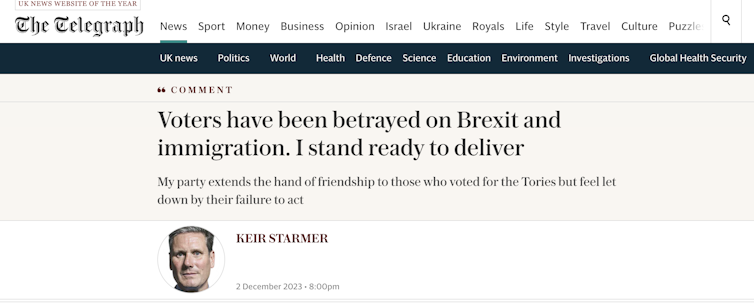Labour leader Keir Starmer has received some criticism from within his own party for publishing an article in the Telegraph, a famously rightwing newspaper, in which he made a direct appeal to voters who have previously supported the Conservative party.
The choice of this publication and Starmer’s decision to seemingly praise Conservative prime minister Margaret Thatcher, who “sought to drag Britain out of its stupor by setting loose our natural entrepreneurialism”, has caused dismay among some supporters. But while this response is understandable, Starmer’s strategy is supported by comparative evidence.
In our recent study, we examined election results in 15 democracies, including the UK, Austria, Denmark and New Zealand, over approximately 30 years between 1986 and 2015. There is a striking pattern in the data – namely that when the public perceives a party becoming more right wing, that party subsequently gains more votes. This boost is all the more pronounced during recessions.
It’s crucial to note that this finding does not mean that parties always gain votes when they shift their policies to the right, because the public does not always recognise when parties attempt to change their policies. The public must actually perceive the rightward policy shift.
Our finding holds even when controlling for public opinion shifts. That means it is not an artefact of parties shifting right in response to rightward shifts in the public.

This means that leftwing parties gain votes by moderating their image towards the centre of public opinion, while rightwing parties similarly gain from radicalising their images. This perhaps helps explain Starmer’s decision to write warmly of Thatcher’s legacy. The move will arguably send a credible signal to the public that Labour has committed to a more rightwing position.
Apart from referencing Thatcher, Starmer made several policy-related statements that would associate his party with a rightward position, including criticising the Tories for “raising the tax burden to a record high”, and warning that “difficult choices” will have to be made so that “every penny is accounted for”.
Perceptions of economic confidence
So, why do parties gain votes when the public perceives them as shifting right? Some additional findings in our paper address this question. First, the public tends to view parties as being more competent at managing the economy when they perceive the party shifting rightward. That’s why we also find that the vote gains from parties’ perceived rightward shifts are amplified when the economy deteriorates. Economic recessions prompt citizens to prioritise parties’ economic competence.
As has been seen in Labour’s case, changing party leadership potentially shifts public perception – and there is research supporting that hypothesis. But if citizens are to cast informed votes, parties must be able to successfully change public perceptions of their policy positions too. Although, there is also research that suggests that parties often fail to successfully convey their policy shifts to voters.
So while Starmer’s words and choice of publication may have caused consternation among some Labour voters and colleagues, there is a logic to it. Our key finding is that when the public broadly perceives a party shift to the right, this perceived shift signals the party’s competence to manage the economy. That enhances the party’s image and its ability to win votes in the next election.
The authors do not work for, consult, own shares in or receive funding from any company or organisation that would benefit from this article, and have disclosed no relevant affiliations beyond their academic appointment.
This article was originally published on The Conversation. Read the original article.







